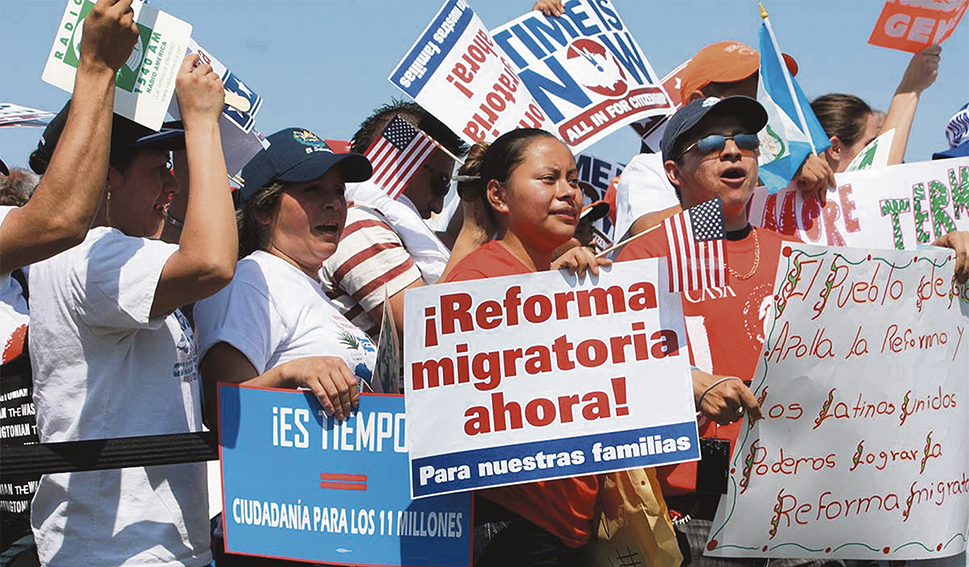¿Puede el Senado lograr una reforma migratoria? / Can the Senate achieve immigration reform?
Por Maribel Hastings y David Torres | WASHINGTON, DC
La inclusión del lenguaje que proveería una ruta a la legalización en el plan presupuestario del Senado abre otro capítulo, esta vez durante la presidencia del demócrata Joe Biden, de la carrera maratónica con obstáculos que ha sido y es la búsqueda de una reforma migratoria que regularice a millones.
Pareciera que se ha juntado todo, desde el permanente discurso pro inmigrante, las decisiones para contrarrestar las más draconianas decisiones antiinmigrantes del anterior gobierno, hasta la oportunidad política del momento, uno de los más propicios para, ahora sí, lograr algo histórico.
Pero ante la negativa republicana de considerar proyectos de legalización argumentando la porosidad de la frontera y ahora utilizando a los inmigrantes como chivos expiatorios, culpándolos de la propagación del Covid 19 —y ante una bancada demócrata con una frágil mayoría donde senadores moderados temen al asunto migratorio a un año de las elecciones intermedias—, el liderazgo demócrata apuesta al proceso de conciliación presupuestaria como el mecanismo para tratar de avanzar una reforma que responda a las promesas demócratas de pasadas décadas que nunca se han concretado.
Dicha conciliación presupuestaria se presenta ahora como uno de los últimos recursos para asumir la corresponsabilidad en la defensa de millones de inmigrantes que lo han entregado todo a este país y que han visto cómo las opciones se han ido reduciendo para obtener una legalización que no llega. Y esperanzas hay muchas.
Pero del dicho al hecho hay un gran trecho. Y aunque se parte de la premisa de que la idea es tratar de regularizar a la mayor cantidad de indocumentados, particularmente a Dreamers, beneficiarios del TPS, trabajadores agrícolas y ciertos trabajadores esenciales, la realidad es que no se ha indicado quiénes serían los beneficiados, ni con base en qué mecanismos se lograría su regularización.
Más aún, es la Parlamentaria del Senado la que decidirá si el lenguaje migratorio puede formar parte o no de la conciliación presupuestaria. En otras palabras, incluir el lenguaje de legalización es haber echado una bola a rodar para ver hasta dónde llega.
Durante años han podido, y con razón, achacarle la culpa a un Partido Republicano controlado por el ala más xenófoba y racista que solamente emplea el tema para atizar a su base más recalcitrante. Pero también es cierto que cuando los demócratas han controlado tanto el Congreso como la Casa Blanca, han dejado pasar varias oportunidades, ya sea por divisiones internas o porque otros asuntos han sido los “prioritarios”.
Bueno, pues este es precisamente un momento de prioridades migratorias que no puede quedar a la deriva nuevamente. Sería cruel, inhumano e injusto. Y nadie quiere una nación decepcionada.
La única constante de esta historia ha sido el tesón de una comunidad inmigrante que sigue buscando la forma de sacar adelante a sus familias, aunque las promesas de los políticos se conviertan en sal y agua. Es su ejemplo, concretamente, el que le da vida al concepto estadounidense de nación de inmigrantes de principio a fin.
Estamos nuevamente ante otra posibilidad de acción. Las próximas semanas y meses nos irán dejando saber si hay avance en el maratón migratorio o si una vez más se trata de una salida en falso. (America’s Voice)
Can the Senate achieve immigration reform?
By Maribel Hastings and David Torres | WASHINGTON, DC
The inclusion of language that would provide a route to legalization in the Senate budget plan opens another chapter, this time during the presidency of Democrat Joe Biden, of the marathon hurdles that has been and is the pursuit of an immigration reform that could normalize millions.
It seems that everything has come together, from the permanent pro-immigrant discourse, the decisions to counteract the most draconian anti-immigrant decisions of the previous administration, to the political opportunity of the moment, one of the most propitious for, finally, to achieve something historic.
Previously, Republicans refused to consider legalization projects, arguing a lack of security at the border and now they are using immigrants as scapegoats, blaming them for the spread of Covid 19. With a Democratic caucus holding a fragile majority where moderate senators fear the immigration issue one year before the midterm elections, the Democratic leadership is betting on the budget conciliation process as the mechanism to try to advance a reform that responds to the Democratic promises of past decades that have never materialized.
This budget reconciliation is now presented as one of the last resources to assume joint responsibility in the defense of millions of immigrants who have given everything to this country and who have had their hopes dashed before. And there are many hopes.
But from saying to fact there is a long way. And although it is based on the premise that the idea is to try to regularize the largest number of undocumented people, particularly Dreamers, TPS beneficiaries, agricultural workers and certain essential workers, the reality is that it has not been indicated who the beneficiaries are, nor on the basis of which mechanisms regularization would be achieved.
Furthermore, it is the Senate Parliamentarian who will decide whether or not immigration language can be part of budget reconciliation. In other words, to include legalization language is to have rolled a ball to see how far it goes.
For years they have been able, and with good reason, to blame a Republican Party controlled by the most xenophobic and racist wing that only uses the issue to stoke its most recalcitrant base. But it is also true that when the Democrats have controlled both Congress and the White House, they have missed several opportunities, either because of internal divisions or because other issues have been the “priority.”
Well, this is precisely a time of migration priorities that cannot be left adrift again. It would be cruel, inhuman and unfair. And nobody wants a disappointed nation.
The only constant in this story has been the tenacity of an immigrant community that continues to search for a way to support their families, even if the promises of politicians turn to salt and water. It is their example, specifically, that brings the American concept of the nation of immigrants to life.
We are again faced with another possibility of action. The next few weeks and months will let us know if there is progress in the migratory marathon or if it is once again a false start. (America’s Voice)



 (1) (2).jpg)


Debe estar conectado para enviar un comentario.